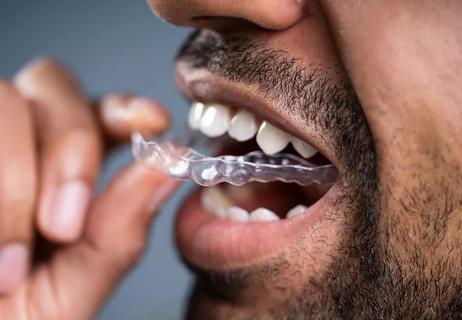If you have discomfort and pain in your face, it could mean something serious is going on

We don’t think too much about our cheeks — maybe if we’re applying blush or if they turn red during an embarrassing moment.
Advertisement
Cleveland Clinic is a non-profit academic medical center. Advertising on our site helps support our mission. We do not endorse non-Cleveland Clinic products or services. Policy
But occasionally, you may feel pain in your cheeks. You may have a sinus infection, a tooth abscess, temporomandibular joint disorder (TMD), periodontal disease, a nerve condition or other medical conditions. If you’re experiencing severe pain, your doctor can help determine the underlying cause.
Dentist Anne Clemons, DMD, explains why you might have discomfort in your cheeks and when to see a doctor.
You might feel a dull ache or a sharp pain in your cheeks. That discomfort usually means something is going on with your body that’s causing you to feel pain. Here are a few common causes.
If you have a sinus infection, which causes inflammation or swelling in the tissues of your sinuses, you may feel pain in your cheeks.
“That’s because your upper cheeks and your maxillary sinuses are right around the same area,” explains Dr. Clemons. “So that pressure and that discomfort from a sinus infection can be felt in your cheeks.”
Your sinuses, the air-filled cavity near your nose, can get infected, leading to a runny nose, headache, nasal congestion and pain in your face, which can be felt in your cheeks and even teeth.
To treat a sinus infection, you can take a decongestant or your doctor may prescribe an antibiotic. Over-the-counter (OTC) cold and allergy medication and nasal saline can also provide relief.
Advertisement
A tooth abscess, an infection around your tooth, usually contains a pocket of pus from a bacterial infection.
“It may not be so obvious that your pain is coming from a tooth,” says Dr. Clemons. “There can even be some swelling, and that swelling sometimes can spread throughout the cheek or area of the jaw.”
Your dentist can determine what kind of tooth abscess you have and how to treat the infection. Options include a tooth extraction, root canal or incision to help drain the pus. Antibiotics may also be used.
Do you grind or clench your teeth often? If so, teeth grinding, also known as bruxism, may result in cheek pain, says Dr. Clemons.
“A lot of people have this habit,” she says. “As they’re clenching and grinding their teeth, they will grab and chew on their cheeks.”
But another way you may experience cheek pain from grinding your teeth is from overworking the muscles under your cheeks.
“Those muscles are really strong muscles that work when you close and clench the jaw, so if you’re really clenching or grinding and overworking the teeth, you’re overworking that muscle and it can become painful,” says Dr. Clemons.
In addition to cheek pain, you may experience disrupted sleep, headaches, earaches and pain with eating.
Your doctor can help relieve symptoms of teeth grinding by fitting you with a night guard. You can also try cognitive behavioral therapy (CBT), exercise, meditation and physical therapy.
Your temporomandibular joint (TMJ), its surrounding muscles and ligaments can be affected by temporomandibular joint disorder (TMD).
“Your temporomandibular joint is where you jaw rotates and moves, it opens and closes and moves side to side and forward and back,” says Dr. Clemons. “That joint and the muscles that help move the jaw can become painful for a number of reasons.”
TMD can be caused by teeth grinding, trauma, an improper bite, arthritis, stress or wear and tear. The symptoms can include jaw tenderness, headaches, earaches and even facial pain.
If you’re experiencing facial pain, it’s more than likely muscle-related, notes Dr. Clemons.
“So just like any other muscle in your body, the muscles that you use to chew with and to move the jaw can become inflamed and become very painful,” she says.
Your dentist can diagnose TMD during your dental checkup. You can try at-home treatments to relieve pain like applying heat or cold packs to your face, eating soft foods, wearing a night guard and using OTC nonsteroidal anti-inflammatory drugs (NSAIDs).
Advertisement
Other treatments include using transcutaneous electric nerve stimulation (TENS), ultrasound and even botulinum toxin (Botox®). TMD surgery may be considered for those with severe pain.
Commonly known as gum disease, periodontal disease is an infection of the gums, bones and everything surrounding the tooth.
“Often, periodontal disease is not something that people are aware of until it gets more severe,” says Dr. Clemons. It can result in toothaches and pain while chewing, which may feel like pain in your cheek.
If you smoke or have poor dental hygiene, you’re more likely to experience gum disease.
You may need to see a periodontist, a specialist who is trained to treat complex gum disease. A professional dental cleaning can help remove plaque and tartar, allowing gums to heal on their own. In more severe cases, infected teeth may need to be removed.
Another cause of cheek pain could be from a swollen salivary gland, also known as sialadenitis.
Most common among adults older than 60, the condition occurs when your salivary gland becomes inflamed. Your salivary gland makes salvia, which helps with swallowing and digestion. It also helps protect your teeth from bacteria.
If you have a swollen salivary gland, you may have a fever, dry mouth, pain while eating and swelling in the cheek and neck area. Your saliva production may be decreased, too.
Advertisement
Your doctor may prescribe an antibiotic and have you drink lemon juice or suck on a hard candy to help increase your saliva.
You might not have heard of trigeminal neuralgia, says Dr. Clemons.
“It’s not very common,” she says. “It typically presents as a pretty intense pain, usually on one side of the face.”
The rare nerve condition affects your trigeminal nerve, one of 12 pairs of nerves attached to your brain. The nerve transmits touch and pain sensations from your head and face to your brain.
You may experience episodes of intense facial pain that can disrupt your daily activities like chewing, smiling, brushing your teeth or talking.
While not that common, trigeminal neuralgia affects people over the age of 50 more than any other age group.
Your doctor can diagnose trigeminal neuralgia through a physical exam and imaging like a magnetic resonance imaging (MRI).
Symptoms can be managed through medication, and surgery is an option for those with extreme symptoms.
It makes sense that you might experience cheek pain and discomfort after undergoing a dental procedure like a root canal.
“The most common reason is from the numbing,” says Dr. Clemons. “For most dental procedures, there’s going to be some anesthesia and that injection can create some discomfort. Often, those injections are around the cheeks to get the teeth numb so that area can feel sore afterwards.”
Advertisement
The tooth, tissues and area around the dental procedure can also be sore and inflamed.
To treat the pain at home, you can use OTC nonsteroidal anti-inflammatory drugs (NSAIDs).
Why might you have pain in your cheeks if you have coronary artery disease (CAD), a condition that affects your heart?
While you may not always have symptoms with CAD, jaw pain can occur briefly or can be associated with angina — chest pain caused by reduced blood flow to the heart — or a heart attack.
“It’s one of the less common presentations of coronary artery disease, but it can happen,” says Dr. Clemons.
The buildup of plaque in your arteries can cause your heart to pump harder to deliver blood to your body. It may feel like chest pain or shortness of breath.
If you’re experiencing any symptoms, including feeling dizzy or lightheaded, weak or nauseous, seek medical treatment immediately. It may be a sign of a heart attack.
Your doctor may talk to you about changing your lifestyle to reduce risk factors, like eating a heart-healthy diet and exercising more.
Since cheek pain is a sign of some other problem, you more than likely want to seek medical treatment so your doctor can determine why you’re experiencing pain.
For temporary relief, you can take OTC nonsteroidal anti-inflammatory drugs (NSAIDs).
You should also do the following until you can see a doctor:
“You have to use your mouth,” says Dr. Clemons. “But you can try to be a little bit easier on yourself.”
While pain in your cheek isn’t always serious, if you’re experiencing severe pain or have swelling, you should schedule an appointment to see your doctor.
If at-home treatments aren’t working, don’t leave it untreated. Complications like nerve damage or an infection can occur.
Signs of an infection include:
“If it’s not resolving on its own or it gets worse, you want to follow up with your doctor or dentist,” advises Dr. Clemons. “There isn’t one solution that will cover everything. Figuring out the cause, whether it’s a sinus infection or toothache, will dictate the treatment.”

Sign up for our Health Essentials emails for expert guidance on nutrition, fitness, sleep, skin care and more.
Learn more about our editorial process.
Advertisement

The soreness could be from the way you sleep, teeth grinding, bite misalignment or other issues

You might think it’s fine, but your teeth and jaw beg to differ

An expert gives us the details

Daily oral hygiene goes a long way to keeping your mouth healthy and your smile bright

Most kids start losing baby teeth around age 6 — but there’s some wiggle room in the timeline

Start weaning your toddler off daytime pacifier use by 12 months old to help prevent dental issues and speech delays

This oral health practice doesn’t have proven benefits, and it’s not a substitute for brushing and flossing

Sinus infections tend to last longer and include symptoms like facial pressure and discolored mucus

Even small moments of time outdoors can help reduce stress, boost mood and restore a sense of calm

A correct prescription helps your eyes see clearly — but as natural changes occur, you may need stronger or different eyeglasses

Both are medical emergencies, but they are very distinct events with different causes